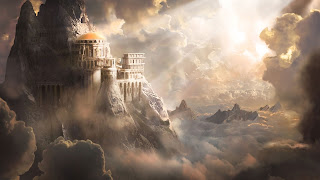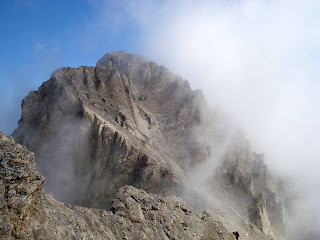Let's we begin to talk about 'Cradle of Civilization' in Greece using
Greek Mythology & Greek Gods.
Homer poet sings about Olympus rock.
"Never blown by wind or snowflake, the rock is surrounded by fresh air. It is clear and clear, and the gods that work there are enjoying a cure that is like eternal life."
According to the Greek mythology, As part of the rally between the sons of Kronos to share the world empire, Zeus received the glorious sky, Poseidon's noisy ocean, and Hades' dark underworld. By common agreement, however, Olympus inherited all the gods and became their abode.
Next were the Horae men, who worked at Olympus, a lesser position.
The Olympus Mountains bordering Thessaly and Macedonia and the Aegean Sea. It
consists of a mountain range that gradually descends from the north to the
plain, and a steep slope facing the Greeks. Equipped with an unnatural
plateau, the Olympus rises 9,000 feet directly. Poetically dubbed the Olympus
'wavy Olympus' because of the tidal waves that were dug by the precipitous
slopes of the thick jungle, the tidal currents. After the clouds combined with
the clouds, the viewer looks like a circular pavilion for God.
Homer poet sings about Olympus rock.
"Never blown by wind or snowflake, the rock is surrounded by fresh air. It is clear and clear, and the gods that work there are enjoying a cure that is like eternal life."
According to the Greek mythology, As part of the rally between the sons of Kronos to share the world empire, Zeus received the glorious sky, Poseidon's noisy ocean, and Hades' dark underworld. By common agreement, however, Olympus inherited all the gods and became their abode.
The
gods who assembled at Olympus formed a special code of laws, morality, and
supremacy. According to Greek mythology, there were twelve main gods and
goddesses. The six gods are,
- Zeus
- Poseidon
- Hephaestus
- Hermes
- Ares
- Apollo
- Hera
- Athena
- Artemis
- Hestia
- Aphrodite
- Demeter.
They were
- Helios
- Celine
- Leto
- Dione
- Dionysus
- Themis
- Eos.
Next were the Horae men, who worked at Olympus, a lesser position.
In addition, the guardians of destiny were the Moray kinds (the three oldest
women), the nemesis and the graceful Gracious, and the nine goddesses of music
(Apollo's supporters of Greek god Apollo), Iris, Hebe, and Ganymede.
See you in next episode...
Quiz
What are the two great epics written by Homer ?
Who was the father of Greek god Dionysus?
Who is the daughter of Uranus in the Greek god Council?
Who was the father of Greek god Dionysus?
Who is the daughter of Uranus in the Greek god Council?





ReplyDelete*The Iliad and The Odyssey
*Zeus
*Themis
#Aurora
#Nature